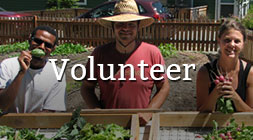Groundviews is Solid Ground’s quarterly print newsletter for our friends and supporters. Below is the June 2014 Groundviews lead story.
If you visit Lettuce Link’s Giving Garden at Marra Farm in Seattle’s South Park neighborhood on any given day from March to October, you’re likely to find a beehive of activity — often involving groups of students from Concord International School (pre-K through 5th grade), located just a few blocks away. Via collaboration with Solid Ground’s Lettuce Link and Apple Corps programs and Concord teachers, students learn about nutrition, the environment, and sustainable gardening and food systems.
At the center of the buzzing, you might find Amelia Swinton, Lettuce Link Education Coordinator, who describes her job as “the meeting ground of two different education programs.” There’s gardening education through Lettuce Link, combined with nutrition education through Apple Corps. In the fall and winter, she partners with an Apple Corps AmeriCorps member to teach weekly indoor nutrition-education lessons at Concord. Then during the growing season, classes move outdoors for hands-on gardening at Marra Farm, where kids get to “Adopt-a-Plot” that they plant, nurture and harvest themselves. Best of all, they get to bring the veggies home for their families to enjoy.
Nate Moxley, Lettuce Link Program Manager, says it’s “a collective approach. We’re working together to achieve common goals around food justice, access and education. Almost everything that we do comes back to that.”
Engaging families
Since 1998, Solid Ground’s involvement as one of several stewarding organizations at Marra Farm has greatly increased access to healthy nutritious food in South Park, and one of the most effective conduits for this has been Concord students themselves. When Solid Ground launched the Apple Corps program in 2007 to do nutrition and fitness education in schools and nonprofits, Concord became a natural partner.
In addition to classroom lessons, there are afterschool events designed not only to engage families, but also to encourage self-determination where healthy food choices are concerned. Annual “Market Night” celebrations are one such event, combining health and nutrition information and activities with cultural sharing presentations, and an open-air market where each kid is empowered to choose from and “purchase” a variety of fresh produce.

Rained out from the outdoor classroom, Joanne cooks up some fresh produce grown at Marra Farm. (Photo by Brad Fenstermacher)
At Concord’s recent Market Night, Amelia introduced us to Joanne – a 4th grader and very enthusiastic budding gardener – who has brought her family to the Farm on several occasions. Joanne tells us, “I like Marra Farm because they garden, and also they let other kids do it.” Her favorite veggie to grow is “peas. They’re actually a little hard; you have to use sticks so they can climb, and you need to water them and weed them every single time.”
Joanne definitely thinks it’s better to grow your own food rather than buy it in a grocery store because, “It’s more nutritious, because you’re proud of yourself, and you think it’s very good!” She says someday, “I’m going to go and make my own garden in the back of my house.” For now, she and her parents are happy to live so close to Marra Farm.
Another way families get involved is through student-led Community Kitchens, known at Concord as “4th Grade Cooks.” Amelia says, “The logic behind 4th Grade Cooks is that the best way to learn something is to teach it – and kids should be the nutrition teachers for their families. Kids are a great ‘carrot’ to get their whole family involved, and then it becomes a night where kids are in the lead in cooking healthy food – the end result being a fun, positive space where everybody eats a healthy, free dinner. And what family doesn’t want to come cook with their cute kid?”

Amelia Swinton helps Concord International 5th graders tell the difference between weeds and edible plants. (Photo by Brad Fenstermacher)
Honoring community strengths
In South Park, 30% of residents speak Spanish, and Latino students make up the largest ethnic group (over 61%) at Concord. As an international school, the dual-language immersion program strives for all students to become bilingual/biliterate in English and Spanish. While Amelia is fluent in Spanish, she says she hopes that Solid Ground’s work in South Park will become “more community based and build leadership amongst folks from the neighborhoods where we’re working. As a white educator not from the community, this feels especially important to me.”
One way Amelia connects the community to gardening and nutrition education efforts is to invite parents and teachers to guest-teach classes in their areas of expertise. Recently, one student’s mom gave his class a tour of the Marra Farm Chicken Co-op that she helped to create. “To encourage families to share some of their knowledge is a really powerful way of switching out those roles of who has knowledge, and who’s the giver of knowledge, and who’s the receiver of knowledge.”
But she adds, “I think the most important kernels of my work at Marra Farm are getting kids to bond with nature and healthy eating – and doing so in a way that acknowledges how agriculture and farming have been felt really disproportionately by different communities. Particularly in the Latino community, there’s been a lot of suffering through agriculture. There is also a huge amount of knowledge and pride. I hope the program continues to grow in a way that acknowledges people’s different experiences, while leading with the really beautiful and important things that happen when people love on their environment, feed their bodies well, and treat animals with respect.”
Amelia says, “Part of what makes nutrition education and the Marra Farm Giving Garden such a natural fit is that nutrition is all about, ‘Eat your fruits and veggies!’ And the Giving Garden makes it possible in a community that would otherwise struggle to access produce. Where do you get fresh vegetables? Marra Farm! Actually being able to say, ‘This is important and this is how you can get it’ is really powerful.”




Leave a Comment